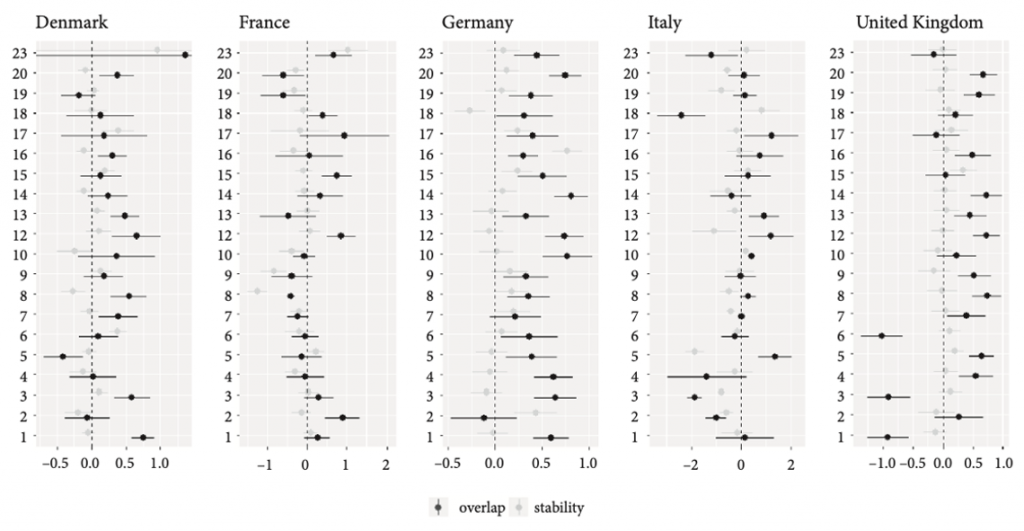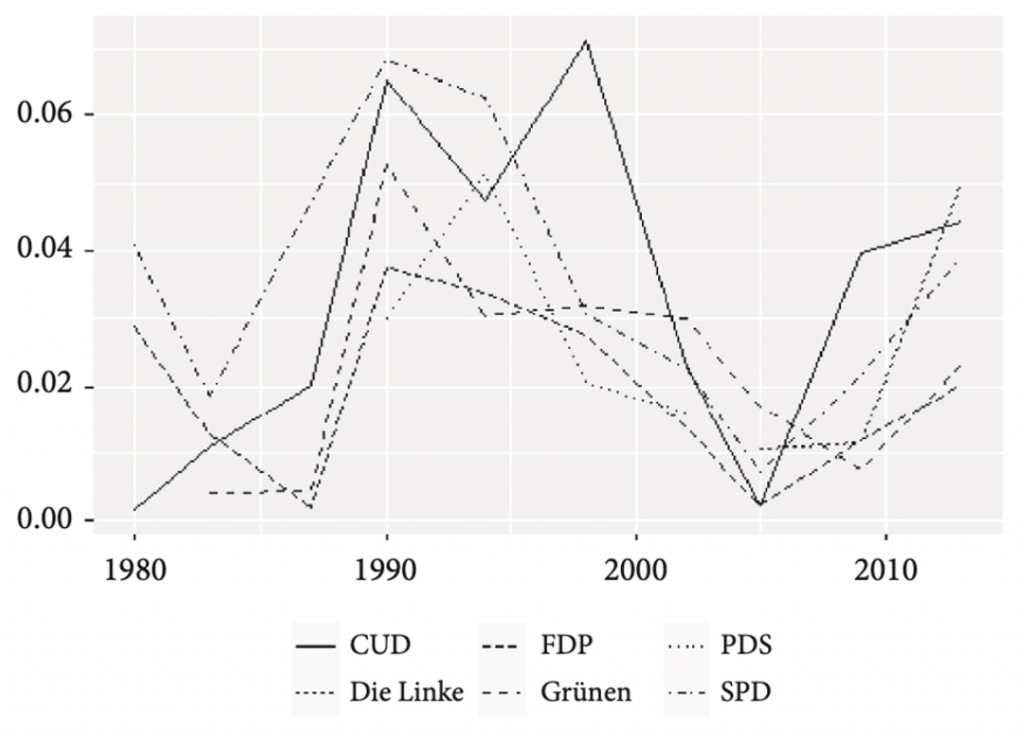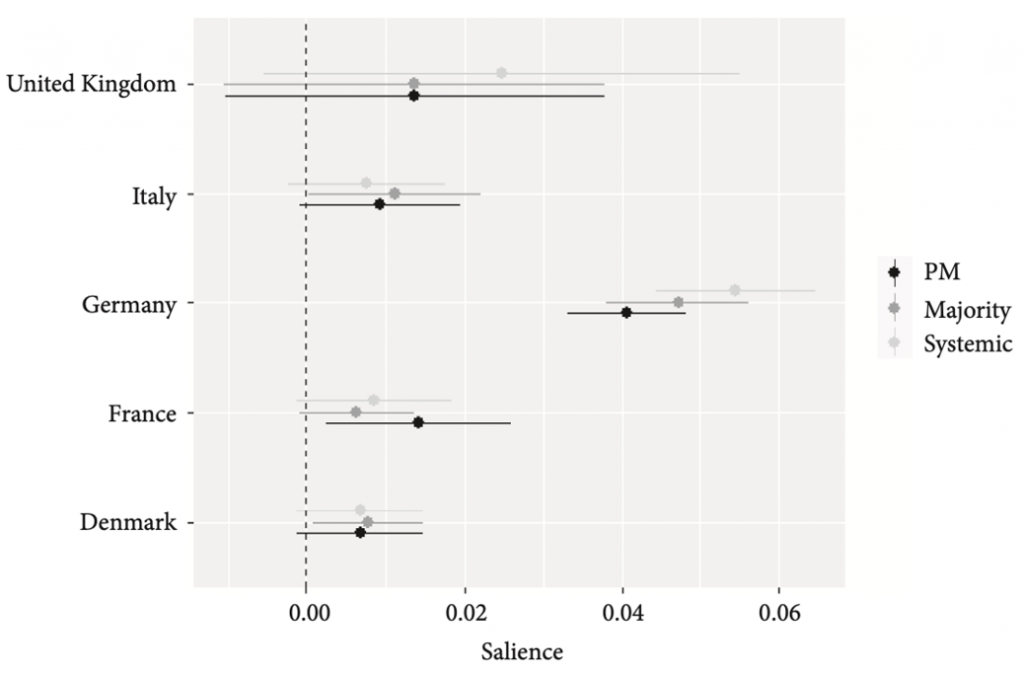Many people believe that all political parties are likely to implement much the same policies once elected, despite the varied promises they make during election campaigns. But how accurate is this belief that elections no longer matter? Using data from five West European countries, Emiliano Grossman and Isabelle Guinaudeau demonstrate that campaign priorities remain a major influence on policy agendas following an election. Yet they also find evidence that policy agendas are not rooted in partisanship, but instead reflect a shared agenda-setting process that extends across the full party system.
There are currently two competing visions on where the campaign priorities of political parties come from. On the one hand, so called ‘issue ownership’ theories predict that parties will develop distinct partisan profiles. Alternatively, ‘strategic’ perspectives emphasise that parties tend to adopt priorities that have the greatest electoral payoffs.
We believe the truth lies somewhere in the middle. We propose what we call a ‘snakes in tunnels’ conception of campaigning. The idea is simple. Parties – who represent the ‘snakes’ in our model – have distinctive identities and priorities. Yet they inhabit a landscape in which they have to respond to a set of shared problems, as well as to the campaign issues put forward by their competitors. These problems and issues structure the way parties navigate their environment, just as several snakes are obliged to take the same path when they encounter a tunnel. This results in considerable cross-partisan overlap, despite parties’ distinctive identities.
In a new book, we test this model using data covering election campaigns in five West European countries since the 1980s: Denmark, France, Germany, Italy, and the United Kingdom. We use original data from the Comparative Agendas Project, which allows us to cover all electoral issues. This stands in contrast to previous studies of the campaign priorities of parties, which tend to focus on the extent to which parties emphasise single issues such as environmental protection or immigration.
Our analysis is based on measuring how the priorities of parties change between elections (the stability of their priorities) and how the priorities of parties compare with their competitors (the overlap between their priorities and the priorities of other parties). We find evidence of ‘tunnels’ in relation to almost all electoral topics. As Figure 1 below demonstrates, overlap with the priorities of competitors is far more prominent in the data than stability.
Figure 1: ‘Stability’ and ‘overlap’ in the priorities of parties in five West European countries
Note: The numbers ranging from 1-23 are issue codes. The bars in each line demonstrate the extent to which ‘stability’ and ‘overlap’ characterise the priorities of parties within each country when it comes to these issues. The issue codes are as follows: 1 – Economy; 2 – Rights and Liberties; 3 – Health; 4 – Agriculture; 5 – Labour and Social Security; 6 – Education; 7 – Environment; 8 – Energy; 9 – Immigration; 10 – Transport; 12 – Policy and Justice; 13 – Social Policy; 14 – Housing; 15 – Market Regulation; 16 – Defence; 17 – Science and Technology; 18 – Trade; 19 – Foreign Policy; 20 – State and Administration; 23 – Culture.
Tunnels of attention are also visible when looking at single issues. Figure 2 below illustrates an example of this by providing a measure of the extent to which German parties have prioritised the issue of housing since 1980. As can be seen in the figure, parties tend to move in tandem, much like the ‘snakes in tunnels’ in our model. These tunnels do not come about because all parties naturally focus on the same issues, but rather as the result of intense competition and because there is a balance of agenda-setting power.
Figure 2: Extent to which German parties have prioritised the issue of housing since 1980
Note: The figure shows the degree to which the issue of housing was prioritised in the campaigns of German parties. A positive value indicates this issue was given more prominence.
The classic understanding of an election is that voters are charged with selecting and authorising policy programmes from a number of distinct alternatives. However, our perspective suggests that elections are also about aggregating campaign agendas. This process of aggregation is a natural consequence of party competition: party platforms are often similar in terms of the issues they emphasise because parties have to respond to their rivals. But a key insight from our work is that tunnels of attention also matter after the election.
The traditional view of parties is that once they are elected, they will focus on a distinctive set of priorities that party leaders want to deliver on. The extent to which they succeed in implementing their desired policies is seen as a reflection of the capacity of parties to get what they want following the election. We argue, however, that the interplay between the priorities of the leading party in a country, other parties in the governing coalition, and the rest of the party system plays a crucial role in the implementation of policies.
Following elections, this interplay between parties tends to result in attention converging on particular issues. This process effectively works like a collective mandate. As all parties expect government action in a number of areas, junior partners in governing coalitions and opposition parties are likely to monitor government policies most closely in policy areas that rank highly on the party system’s agenda. In this way, tunnels of attention shape the public policy process.
Our findings provide support for this interpretation. A key finding is that the priorities in party campaign manifestos have an important impact on government policies following the election. As Figure 3 shows, this relationship varies across different countries, but it is significant across all of the countries we studied with the exception of the UK. We also find evidence that this impact has not declined over time.
Figure 3: Relationship between priorities in campaign manifestos and government policies in five West European countries
Note: The figure shows the relationship between the priorities in the campaign manifestos of parties and the policies that are prioritised by the government following an election. Salience values above 0 illustrate the degree to which the policies prioritised in manifestos matched the policies implemented by the government. Horizontal lines that are entirely above 0 indicate a statistically significant finding. The three different lines refer to the campaign priorities of the leading party (party of the Prime Minister – PM), the priorities of parties in governing coalitions (Majority), and the priorities of the rest of the parties in the party system (Systemic). As can be seen, there is a significant relationship in all of the countries with the exception of the UK.
The British outlier is all the more puzzling because we would expect that the UK’s majoritarian electoral system would provide the government with unique power to deliver on its campaign pledges. Party incentives may help resolve this paradox. We analysed electoral incentives across the electoral cycle and found evidence of stronger linkages between the priorities in campaign manifestos and government policy during periods when electoral incentives are high. This effect is present in all countries, in particular in the UK.
In countries like the UK that use majoritarian systems, governing parties have greater power to implement their desired policies. However, these governing parties also face less pressure from opposition parties who might hold them to account for drifting away from their manifesto commitments. The result is that while these governing parties have more power, they also have fewer incentives to stick to their campaign priorities. In contrast, governing parties in countries that use consensual systems have less power to implement their priorities, but this means the ‘tunnels of attention’ effect we identify has a greater impact and they therefore have stronger incentives to stick to their campaign priorities.
Overall, our work provides a comprehensive mapping of electoral and policy issue agendas in five West European countries since 1980. Our findings also help renew mandate theories of representation and open up new questions about the widely accepted idea that majoritarian systems are more responsive than consensual ones.
For more information, see the authors’ new book, Do Elections (Still) Matter? Mandates, Institutions, and Policies in Western Europe (Oxford University Press, 2021)
Note: This article gives the views of the authors, not the position of EUROPP – European Politics and Policy or the London School of Economics. Featured image credit: Elliott Stallion on Unsplash






